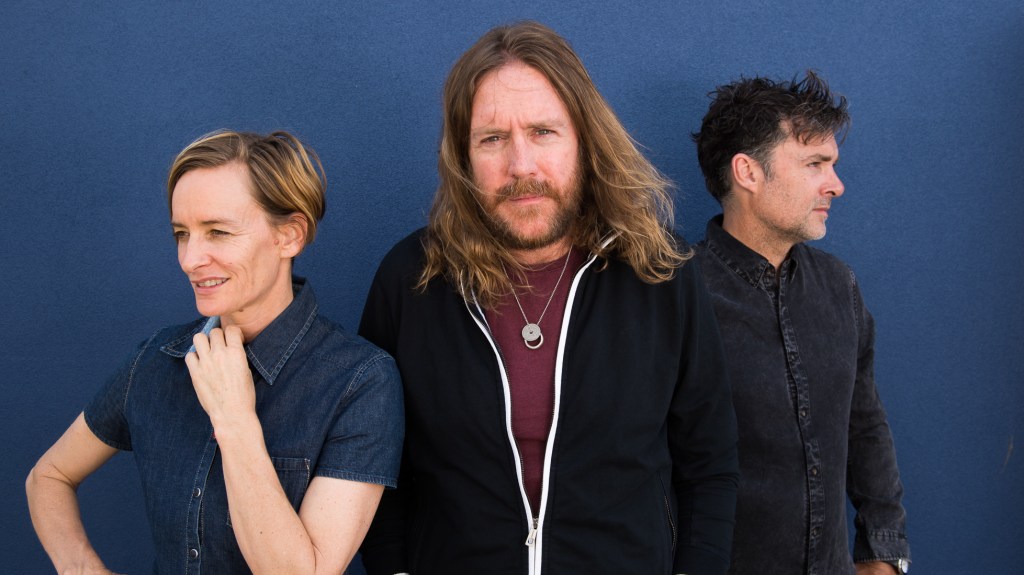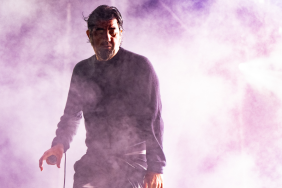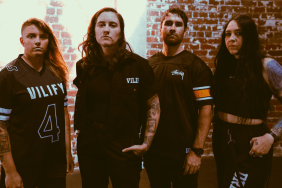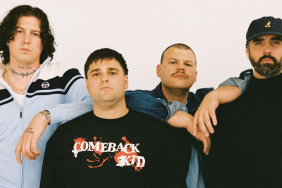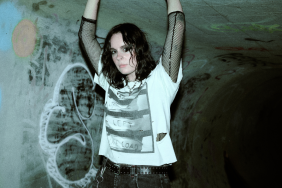It’s safe to say Spiderbait’s Mark ‘Kram’ Maher is much the same man now as he was when the band won the Hottest 100 with ‘Buy Me a Pony’ 22 years ago – albeit a more confident, relaxed version.
The band toured the country last year for the 20th anniversary of their hit record Ivy and the Big Apples, which saw Kram and his band mates Janet English and Damian Whitty win their first ARIA – an accolade Kram says the band wasn’t entirely ready for.
Hailing from the ‘glory days’ of Aus rock in the late 1990’s, Spiderbait will join their contemporaries The Living End, Veruca Salt, Tumbleweed, The Lemonheads and The Fauves for a festival tour with A Day On The Green next month.
Kram spoke to Music Feeds’ Jade Kennedy about dealing with recognition, being confident without sounding like a wanker, and the possibility of an exclusive Hot Rollers reunion at the upcoming A Day On The Green shows.
Music Feeds: Kram! What’s been going on?
Kram: I’m just at my house in Byron. I’ve just been away playing a lot of shows and I’ve just got back yesterday, so I’m just settling back into beach life… so I’m in jean shorts and just enjoying the heat, about to go to the beach after my interviews, so yeah… it’s nice to be home!
MF: Sounds fantastic. And how did the Easybeats tour go, that only finished up in December?
Kram: Oh it was fantastic. It really blew us away, the response to that, and I guess between all five of us we’d all known each other for so many years we had a ball together, it was so funny. But the performances were all fantastic, like I loved doing those songs. At the last show at The Forum in Melbourne was brilliant, we just had the best time. So I think there’s talk of it coming back, it was such a successful tour I think there’s talk of it maybe coming back later this year, which is really great because we’d all like to do it again.
The Enmore show in Sydney was really emotional, because a lot of the old Alberts crew came along, I mean Fifa (Riccobono) was there, members of Malcolm Young’s family and members of Stevie Wright’s family were there, and the show had been done not long after tragically Malcolm and George had passed, and, you know, there was a lot of energy and love in the room, so we were really blown out by that. That kept going backstage after the show, too.
I don’t know, it’s interesting considering how music can affect people, not just the fans but the bands themselves, everyone around them… these funny little things called songs, you know, just something that you hear, has this effect on you. I think this A Day On The Green thing is a really similar feeling. I know last time we did one last year, it had that same sense of something special, so it’s going to be good.
MF: Are you pumped to be playing the ‘Monster’ show with A Day On The Green? I mean, the lineup is pretty amazing.
Kram: Yeah, it’s weird because the last time we did it, it was us, You Am I, Something For Kate, The Meanies and Jebediah, and it was this real Homebake/’90s sort of indie type of lineup. This is really similar, I guess a step up with the international band, so I guess it’s kind of like going from Homebake to Big Day Out in a way.
I think, in a sense, the brand has sort of changed in a way, because prior to that, Mick from A Day On The Green was saying that generally their shows were pretty mellow, like they had Leonard Cohen and a few other things, a lot of ’80s stuff, more of a retro thing, but this ’90s thing sort of exceeded all expectations and I remember all of the shows were jammed and it was just so exciting, I’m sure this will be the same.
It’s almost like another chance to celebrate that music, but maybe celebrate a bit rowdier than what they’re used to. It was just kick arse, the festivals were fantastic so we can’t wait to do it again, we’re absolutely stoked.
MF: Well a lot of people have been saying since this year’s Hottest 100 that Australian music ‘peaked’ in 1997, which is obviously the countdown Double J revisited this year. Do you agree?
Kram: I don’t know! I never heard that, but I was too busy listening to people saying they should change the date of Australia Day. But look, there’s a lot of antagonism amongst a lot of people about the music of today, or whatever’s going on, but I don’t know, there’s so many great bands around now and so many great songwriters, and it’s important I think for us ’90s bands to remember it’s actually much harder to be a band now, because you don’t have that extra income from record sales like you did when we were around. It’s a tougher gig.
Also there’s maybe less venues, there’s maybe less opportunity to get played on radio. I mean, I know a lot of great bands who were maybe played on Triple J as young bands but then maybe weren’t played as much the second time around, and their career really suffers. Bands from our period, around ’97 like you’re referring to, maybe were lucky in a sense that there were more options open for them to get played. But also, in another way, they also paved the way in a sense that not long before that they were used to not getting played by anyone.
Literally before Triple J and a lot of alternative stations like Triple Z in Brisbane and Triple R or PBS in Melbourne, there was nowhere that alternative music would get played, it was all just garbage, horrible, really bad commercial stuff. So I guess in a way we didn’t know any different, so anything was a bonus when you actually changed from this indie band playing to no one, to this huge national or even international phenomenon.
I think these days bands almost have that expectation, that if you’re not huge then you’ve failed. In terms of the quality of music, I think every era has it’s great highs and lows. But I’m very sentimental about that ’97 period. Last year, they played the Hottest 100 that we won, and that was really amazing, like, someone rang me up and said, “You won the Hottest 100 today!” and I was like, “Oh yeah, we’ve won it twice now, just 20 years apart”.
But the ’97 one was just, yeah, a lot of great songs and you can’t deny that maybe there was a bit more variation back then, but it probably says as much about what’s being played as what’s not. I can understand why a lot of people are perhaps relating to that countdown more than the one today, but that also depends on the age of the person and who you’re talking to.
MF: Well yeah, I think I was in high school in ’97, maybe year nine or something, so that was my ‘peak’ in terms of music fandom.
Kram: Yeah! I mean, I’m sure there’s someone now who was listening to that and heard all the Powderfinger songs from that era going, “Wow, this is so great!” and maybe someone else listening to the actual countdown was getting into the Gang of Youths songs. I mean, there’s similarities… there’s always going to be great bands, there’s always going to be great artists. My thing is I just want to make sure that everyone gets a chance to get played so that everyone gets heard. That’s what we want, really.
So I do wish there was more than one Triple J, there were like four or something, so there’d be a lot less pressure on everyone having to get played on there because I reckon there’s so much music now that comes through that station, it must be hard to play everybody. Basically if you do get played, you stand a lot greater chance of being heard and thus being on that Hottest 100.
But it’s great that the scene has changed so much as well. Like, back when we won the Hottest 100 we were like, “Oh, that’s so great,” but it wasn’t earth shattering. We didn’t all know quite what it meant until further down the track. But now, it’s so big that if you win it, it’s just like, “Holy shit,” like it’s almost bigger than having a chart number one.
That’s symptomatic of the Australian scene and this music – ‘alternative music’ I guess is what it used to be called, and all of the different styles within that – is symptomatic of that scene being so big and so successful now. So in some ways things are better now, but it all depends on your point of view and which direction you’re looking at it from.
MF: I mean you guys were fairly – for lack of a better word – blasé about the whole thing back in the day. Like, didn’t Richard Wilkins accept your ARIA one year?
Kram: Yeah. I mean eventually we did start going to it. But we’re pretty blasé about things now. I mean, I have been to the ARIAs plenty of times since. I also think the reason for that was we just didn’t quite know what to do with that attention; we’d never had that sort of attention before.
Like I think by the time years later, when ‘Black Betty’ went to number one, we were a lot better at understanding what to do and stuff while still being ourselves. You know, we accepted awards and we were cool. But when Ivy won that ARIA we were just like, “Oh… Shit… Oh… Um… Mmm…” and kind of just unsure as to what to do, and how we fit into the music scene, because we always felt like misfits, in a way. We were very comfortable on stage, but all the other stuff we were just weird about so we didn’t know what to do.
These days we’re a lot more comfortable with it I guess, although essentially we’re still exactly the same as we were then, except maybe we’re a bit more experienced when it comes to knowing how to deal with things, that’s all. But the essence of the band is the same. I mean some people celebrate when they win something big, and others just kind of freak out, and others sit there and don’t really know what to think because it’s almost too much to take it. It kind of felt like that for us.
MF: Well I guess the ARIAs has always been a fairly commercial thing and you weren’t really a commercial band in those days.
Kram: I think in those days there was still a lot of conflict in terms of all the bands getting signed were bands that had been doing their own thing, and they were all very wary of major labels and very wary of the commerciality of music and in some ways I think the ARIAs sort of represented that. It was almost like you were sure if you wanted to back it.
But as time wore on and you realised that you had become part of the new sound, it wasn’t anything to be shitty about, it was something to be celebrated because you’re essentially paving the way for a new mentality and a new sound and a new way of doing things. We always thought that the punk rock would be killed by the business, but essentially the punk rock became the business, and thus everyone benefited because suddenly people could get livings out of their shit.
MF: And how about you personally? How has the industry changed for you, or how has it changed you, in the last 25 to 30 years?
Kram: Oh shit, well it is nearly 30 years that I’ve been in this business, and it’s so weird because I still – and all of us – we’re just a very youthful band. Essentially when we’re not on stage we just have this sense that time hasn’t really passed. I mean, if anything we’re better musicians now, a better live band in terms of playing a big festival, and we’re more relaxed. I think one thing that does happen to you if you manage to stick around and maintain your relevance and success – and I’m sure this is the case for people like Paul Kelly, and Nick Cave, and other people – is that you’re just a lot more relaxed about who you are.
When you’re a young band you’re always so worried about what people are saying and whether the radio is playing you, and asking yourself all these questions like, ‘are you relevant?’ and, ‘are you going to stay successful?’ and constantly questioning. These days I’m a lot more relaxed about it and just happy that I’m able to still do it – I approach our shows and anything we do with a real state of euphoria. It’s just beautiful to be alive and playing music, like it’s just fucking sick.
It has actually improved us as a band, in a way, by letting us be able to let loose. And the audience really does come with you, our shows are about celebrating. It was the same last year, we did the biggest and most successful tour of our career sort of 25 year in, which was a beautiful surprise. I guess you’re kind of free to feel confident without feeling arrogant. You can sit back and feel proud of your achievements and feel proud of who you are, and it’s really hard to do that when you’re much younger.
Australian bands are not very good at saying, “Hey I’m a rock star and I kick arse,” because it’s like well no, you’re a wanker. But these days it’s like, this is actually my life’s work and I’m really proud of it. It’s taken a while but I’m glad to feel that way now.
MF: Do you think social media has helped with that a little bit? Like, the immediacy of getting online after a show and seeing in real time people’s photos and people’s reactions and the rest?
Kram: It’s a double-edged sword I guess with social media. In one way it’s great because you can get that direct contact with your fans, and we do do that with our Facebook and stuff, and a lot of fans are just so loyal to us, and the new ones coming along. But I also like the anonymity of the old days. That’s one of the things I do like about getting sentimental about the ’97 and ’96 Hottest 100 countdowns is it was all before YouTube and seeing how many hits you had; a lot of the immediacy that now exists in music was not there then, so there was maybe more mystique. It was possible to watch a clip and go, “Wow, this is the coolest shit I’ve ever seen,” as opposed to watching the same clip and seeing that it’s only got 200 hits and suddenly it’s not as cool as you thought it was.
So taking the numbers away, which is kind of the way it used to be, allowed you to exist in your own world. Also because I find playing music at my shows such a public revealing of myself, the antithesis of that for me is that I like being alone and I don’t want people to follow me – that’s kind of why I don’t have any personal social media whatsoever. I don’t have any desire to be followed or to follow other people, I’m just off doing my own thing. But in terms of the band and the band’s ability to connect with the fans and vice versa, it’s really cool.
MF: Well back to music, you had a band with Richie from Tumbleweed ages ago, so is there any chance of a Hot Rollers reunion at A Day On The Green?
Kram: I hadn’t even thought about that! That’s a great idea! You know, I think he’d be super keen. We loved making that record, and that was so funny because we made that record at the height of both our ‘rock stardom’ when our record label was just spending so much money on us, and we just smoked so much pot and wrote the weirdest record ever. But it was sooo much fun, we’re just like brothers, the two of us. But we never really got it together.
There’s a really funny thing of us on Recovery, which you can look up online I think, of us being interviewed and it was just one of those classic ’90s really uncomfortable interviews, and just like not coming across too confident and all that sort of shit. I’m just so not like that now, like, I could talk to you for two hours no problem, like, ‘Yay! Woo!’ whereas back then, you were filled with so much self-doubt or not knowing what people were going to think. This is why I think if I was a kid now with social media I’d be fucking loony tunes, I couldn’t hack what people were saying, you know? But it’s interesting because I do think this would be a great place for Hot Rollers to play a song, so we’ll see what happens. I’ll ask Rich and see what he wants to do.
MF: Well it’s 20 years this year, isn’t it?
Kram: Yeah, exactly! A lot of people really loved that record, we both get people coming up to us all the time saying how much they loved it. I think at the time the record label announced it was coming out everyone thought it was going to be the biggest, heaviest stoner rock record, and it turns out to be this tripper stoner pop record, because we were both huge Beatles fans and we liked weird shit like, you know, odd folk and stuff. But that’s often the case with solo records – they’re not always what you’d expect.
—
A Day On The Green 2018: The Living End, Spiderbait, Veruca Salt, The Lemonheads, Tumbleweed & The Fauves
Tickets on sale now.
Saturday, 24th February
Bimbadgen, Hunter Valley
Tickets: Ticketmaster
Sunday, 25th February
Sirromet Wines, Mt Cotton
Tickets: Ticketmaster
Saturday, 3rd March — NEW SHOW (Without Tumbleweed & The Fauves)
Red Hill Auditorium, Red Hill
Tickets: Red Hill Auditorium
Saturday, 10th March
Josef Chromy Wines, Launceston
Tickets: Ticketmaster
Sunday, 11th March
Mt Duneed Estate, Geelong
Tickets: Ticketmaster
Saturday, 17th March
Leconfield Wines, McLaren Vale*
Tickets: Ticketmaster
*The Lemonheads not performing
